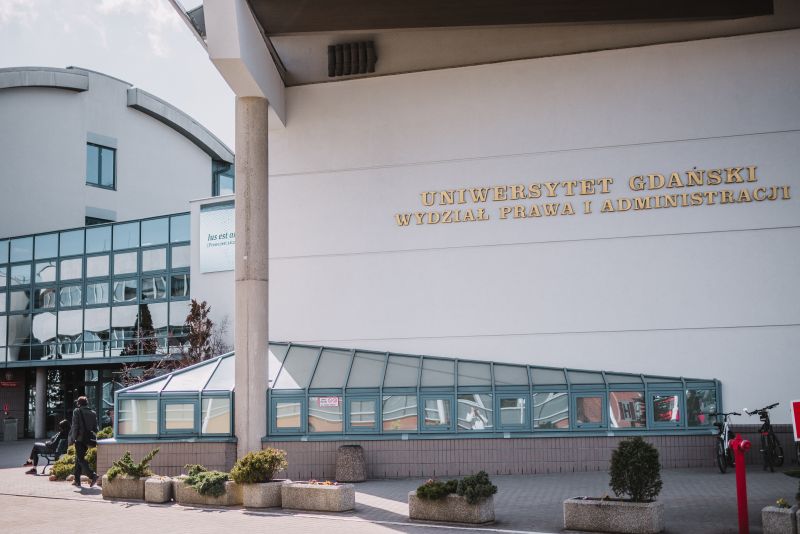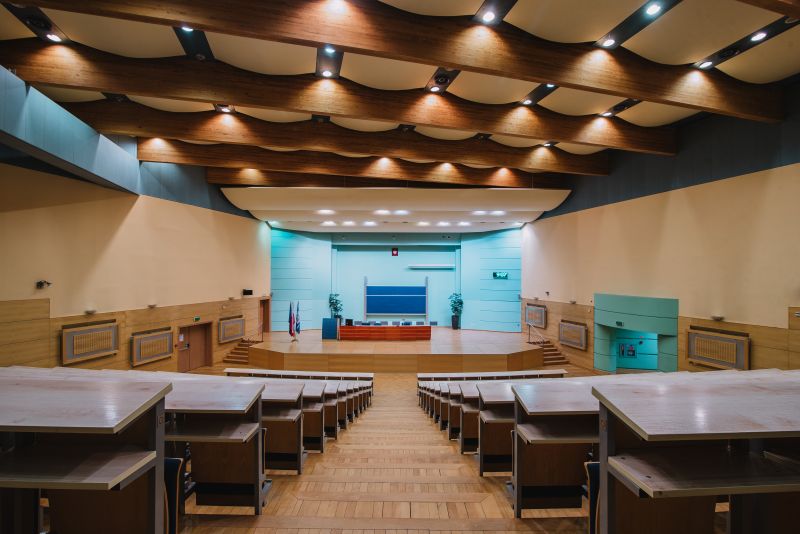About us
The Faculty of Law and Administration
The first universities of Europe, founded in the Middle Ages, had four faculties: liberal arts, theology, medicine, and law. The Faculty of Law and Administration directly follows this tradition, while "law" was later supplemented in Poland by "administration", which resulted from the two main fields of study conducted at these faculties. So here we have two terms, both nouns, and "law" is a set of norms, something that we most often get from the legislator, but also a bundle of powers and obligations of each addressee of law ("rights") – both of these meanings are very important. "Administration," on the other hand, derives from the Latin administrare – all persons and means for managing, leading, and governing the state in a traditional way, but not only – today, the term has gained wider meaning (e.g. international, European, local government, economic administration). Therefore, the name of the Faculty fully reflects what students learn and what is the most important subject of their research.

The University of Gdańsk was established by the regulation of the Council of Ministers of 20 March 1970 by merging the Higher Pedagogical School in Gdańsk with the Higher School of Economics in Sopot. The Faculty of Law and Administration was established within the University and professor Stanisław Matysik became its first dean. The first session of the Faculty Council was held on 5 October 1970. The Faculty was made up of both local staff and those incoming from other academic centres – Nicolaus Copernicus University in Toruń, Adam Mickiewicz University in Poznań, Jagiellonian University, and Maria Curie-Sklodowska University in Lublin. In the first year of its existence, the Faculty of Law and Administration educated only administration students. Extramural Law studies were started a year later (taking over students of Nicolaus Copernicus University studying in a Gdańsk consultative point), and in 1972, in a full-time mode. In the same year, the Faculty was authorised to confer the degree of Doctor of Laws, and in 1981, a post-doctoral degree in law (Doctor Habilitatus). In 1980, doctoral studies were launched for the first time. From the very beginning, the Faculty has developed and grown in strength in every aspect of university life, especially in teaching and research.

The new Faculty of Law and Administration building was completed in 2001. It covers 25,000 m2. It provides comfortable conditions for teaching and studying. The main hall (400 seats) is the largest of all at the University of Gdańsk, and 3 auditoriums (300, 200, and 150 seats) and 33 teaching rooms (60 to 20 seats) allow more than 2,000 students to attend classes at the same time. The hall and auditoriums are equipped with modern multimedia tools. There are also two courtrooms (equipped to resemble real courtrooms) where simulations of court hearings are held, as well as numerous seminar rooms, the Law Library (specialised Faculty library), staff offices, faculty administration offices, even a ballistics laboratory. A small hotel for guest professors is located in a separate section of the Faculty building. The Faculty of Law and Administration building is fully adapted to the needs of people with disabilities.

The Faculty of Law and Administration is a major research centre in Poland, where many different national and international research projects are carried out. The results include numerous doctoral and post-doctoral dissertations. Their high level is evidenced by regular awards and distinctions, including in the prestigious competition of the "State and Law" journal for the best doctoral and post-doctoral theses in legal sciences. The research conducted at the Faculty covers all basic fields of law, theory and philosophy of law, and historical disciplines. The research projects carried out at the Faculty also touch upon the latest problems emerging in the legal space. The Faculty is a leader in many rankings. In subsequent parametric evaluations, it has been ranked high for years. Faculty academic staff publish on average nearly a thousand publications each year, as well as deliver hundreds of speeches at national and international conferences in which they present the results of their research. Their work in recognised national and international scientific bodies, in practice, including the wider judiciary, offices and other important institutions, allows for the practical application of their knowledge in education and in the modern legal profession.

The Faculty's alumni include many distinguished academics, as well as individuals who play important roles in the public, political, social, and economic life of the country. These include high-ranking civil servants and those holding various significant public functions: Marshal of the Sejm, Minister of Justice, Minister of Interior and Administration, several deputy ministers, Chief of Police, Chief of Border Guard or National Prosecutor. Our alumni have also sat in courts and tribunals, including the Supreme Court. Studies at the Faculty of Law and Administration were completed by the Pomeranian voivodes, the presidents of Gdańsk, Gdynia and other cities and town in the region. The late president of the Republic of Poland, Lech Kaczyński, was a research and teaching employee at the Department of Labour Law at The Faculty of Law and Administration in the years 1971-1997. During this period, he obtained both PhD and Doctor Habilitatus degrees. Jolanta Kwaśniewska, Poland's First Lady from 1995 to 2005, also graduated from our Faculty.
On the initiative of the Faculty, five honorary doctorates of the University of Gdańsk were conferred on the following: Prof. Władysław Wolter (in 1986), a criminal law specialist from the Jagiellonian University, for his contributions to the study of criminal law and to the deepening of its humanistic content in the service of man and the rule of law; François Mitterrand (in 1993), President of France, in recognition of the great contribution of action and thought to the realisation of the ideals of freedom and fundamental human rights, independence, peaceful coexistence and cooperation of nations, social justice, and traditional Polish-French friendship; Prof. Ewa Łętowska (in 2008), the first ombudsman of the Third Polish Republic, judge of the Constitutional Tribunal, for promoting the idea of the democratic rule of law and shaping the legal consciousness of the public; Prof. Bernd von Maydell (in 2013), from the Max Planck Institute, for his special contribution to adapting Polish legal solutions to European standards and strengthening scientific cooperation between German and Polish research centres in the field of legal and social sciences, and Prof. Lech Garlicki (in 2017), a constitutionalist from the University of Warsaw, judge of the Polish Constitutional Tribunal (1993-2001) and European Court of Human Rights (2002-2012) for his doctrinal and jurisprudential contributions to the rule of law, especially the protection of human rights and democratic institutions in Poland and Europe.

Today, one cannot live outside the omnipresent system of social norms, i.e. the law. It is also impossible to live outside the state, a structure of public governance organised in the form of administration. Since there is no escape from this, perhaps the best alternative is to understand the world of norms around us and learn how to navigate through it so that we can effectively defend and exercise our rights. It may be worth being a well-educated person who understands the mechanisms of the modern world in which they came to live. Understands them and is able to use their knowledge and competence – acquired during the studies at the Faculty of Law and Administration – well. But it is not just for yourself and in your own interests, because an important part of both the academic and legal ethos is to serve other people. While teaching others, we learn ourselves, and we do not forget values and ethics. If you look at it from a purely practical point of view – whether you want to be a lawyer, judge, prosecutor, advocate, notary, public administration official, international organisation worker, politician, journalist or even a poet – the studies at the Faculty of Law and Administration give ambitious people a chance to get a very good education, allow them to gain a prestigious, socially respected profession, and most importantly, broaden their horizons by allowing them to understand the world around us.
Prof. Wojciech Zalewski
Dean of the Faculty of Law and Administration, University of Gdańsk




